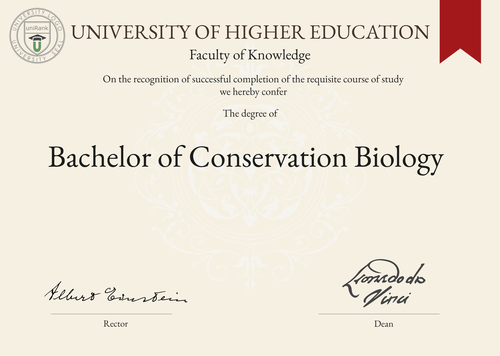
Bachelor of Conservation Biology (BCB)
Guide to University Programs/Courses
Bachelor of Conservation Biology (BCB)

Program/Course Name
Bachelor of Conservation Biology
Program/Course Abbreviation
BCB
Duration Range
3-4 years
Tuition Range (US, UK, AUS, NZ)
$10,000-$50,000 per year
Overview
A Bachelor of Conservation Biology degree is designed to provide students with a comprehensive understanding of the biological and ecological principles that underpin conservation efforts. Students will learn about the diversity of life on earth, the threats facing biodiversity and the strategies used to protect and restore ecosystems. This degree is ideal for students who are passionate about the environment and want to make a positive impact on the world.
Curriculum Overview by Year
- Year 1: Introduction to Biology, Ecology and Conservation
- Year 2: Biodiversity and Ecosystems, Conservation Genetics and Wildlife Management
- Year 3: Conservation Policy and Law, Restoration Ecology and Field Methods
- Year 4: Conservation Planning and Management, Climate Change and Conservation and Capstone Project
Key Components
The key components of a Bachelor of Conservation Biology degree include a strong foundation in biology and ecology, an understanding of conservation policy and law and hands-on experience in the field. Students will learn about the threats facing biodiversity, the strategies used to protect and restore ecosystems and the importance of community engagement in conservation efforts.
Career Prospects
Graduates of a Bachelor of Conservation Biology degree can pursue a variety of careers in the field of conservation, including roles in government agencies, non-profit organizations and private companies. Some common job titles include conservation biologist, wildlife biologist, environmental consultant and park ranger.
Salary Expectations
The salary expectations for graduates of a Bachelor of Conservation Biology degree can vary depending on the specific job and location. According to the Bureau of Labor Statistics, the median annual salary for conservation scientists and foresters was $62,660 in May 2020.
For a more accurate understanding of salary expectations, you can utilize the Job Sites Search Engine, from our sister site jobRank, which searches over 4,600 job sites worldwide. Make sure to specify not only the job title but also the country you are interested in.Conclusions
It is important to note that the duration, tuition fees, curriculum, key components, career prospects and salary expectations of a Bachelor of Conservation Biology degree can vary depending on the country and university where the degree is pursued. However, this degree provides a strong foundation in biology and ecology, an understanding of conservation policy and law and hands-on experience in the field, making it an ideal choice for students who are passionate about the environment and want to make a positive impact on the world. Visitors can search for where this specific degree is offered anywhere in the world through the uniRank World Universities Search Engine.
World Universities Search Engine
search for Bachelor of Conservation Biology (BCB) and add the Location (country, state etc.) or specific University you are interested in studying at.
Query examples:
- Bachelor of Conservation Biology (BCB) United States
- Bachelor of Conservation Biology (BCB) United Kingdom online
- Bachelor of Conservation Biology (BCB) Australia international students
- Bachelor of Conservation Biology (BCB) University of California
- Bachelor of Conservation Biology (BCB) University of London tuition fees
- Bachelor of Conservation Biology (BCB) University of Sydney scholarships